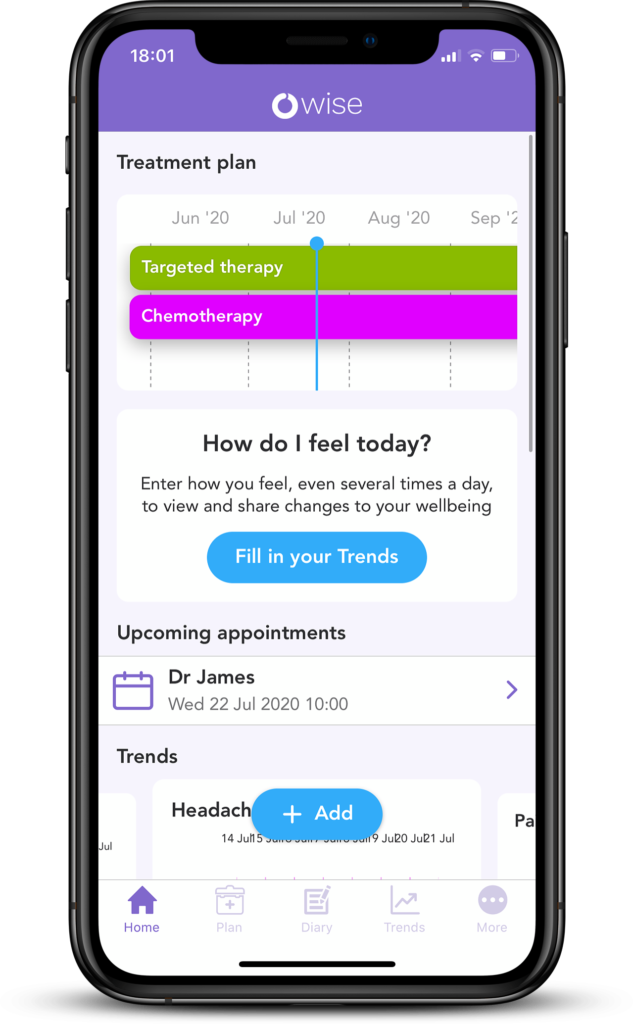
Cognitive decline, often referred to as ‘chemobrain’, affects up to 75% of patients during treatment with 35% reporting symptoms post-treatment 1. As Patricia Ganz, M.D., of UCLA’s says: “Cognitive rehabilitation should be a core part of cancer survivorship care, as cognitive symptoms are very common and have a profound effect on people’s lives”. In this blog we’ll take a closer look at Chemobrain and some of the tips for managing it.
Cognitive decline and hormone therapy
In cancer treatment, cognitive decline is usually only spoken about as being a side effect of chemotherapy (hence, chemobrain). However a recent clinical trial by Wagner et al. (2020) suggests that women may develop cognitive decline as a side-effect of hormone therapy as well 2. The study looked at two groups of women diagnosed with early breast cancer who were randomly assigned to chemotherapy + hormone therapy vs. hormone therapy alone, and assessed their cognitive impairment. They found that both groups reported significant levels of cognitive impairment.
“I think we’ve generally assumed that cognitive impairment is due to chemotherapy. Our findings tell us that hormone therapy may also play a role.”
Lynne Wagner, PhD
Plasticity of the brain
Although you may develop cognitive decline during treatment, it’s important to remember that the human brain is extremely plastic, and things can be done to help recover your cognitive abilities. Neuroplasticity is well-recognised today. However, up until the 60s scientists did not believe in this and it was a female neuroscientist, Marian Diamond, who was one the first to demonstrate in 1964 that the adult brain can change 3.
Marian Diamond was the scientist who analysed Einstein’s brain!
What can I do about Chemobrain?
Here are some things that have helped those before you to minimise their cognitive decline:
- Daily Organisation
- Keep all information for the day in one place – notes, schedules, plans
- Make lists and write daily checklists of activities you plan to complete
- Avoid trying to do too many things at the same time
- Do the most challenging tasks at the start of the day, or when your energy levels are highest
- Pick a place for commonly lost objects (e.g. keys) and keep them there
- Medical Organisation
- At doctor appointments, make audio recordings of your conversations – that way you can replay any missed or forgotten information (tip: you can do this securely in the OWise app)
- Generate a list of questions that you want to ask your doctor before the appointment (tip: OWise generates a personalised list of suggested questions for you, right in the app)
- Keep track of your memory
- Exercise your brain
- Sudokus
- Crosswords
- Puzzles
- Study a new language
- Stay healthy
- Keep a healthy diet
- Keep moving – regular physical exercise has been shown to help with cognitive decline during cancer treatment 4
- Get a good night’s sleep, and rest during the day when you feel you need to
- Communicate
- Talk to friends and family members who can remind you of things. They can also be a great outlet to discuss the problems you are facing.
- Talk to your cancer care team about the cognitive issues you are facing as they will be able to advise you further

The OWise breast cancer app can be a great organisational tool if you are suffering from cognitive decline. It allows you to take notes and keep all of your cancer-related information in one place. It also allows you to track your brain function, fatigue and physical effort, amongst 30 trackable side effects and symptoms. View your trends over time to learn from patterns and track your progress.
Try out these tips and let us know if this article has helped you. Do you have any comments or suggestions?
Useful Links
For more information and tips to overcome your cognitive decline, check out these great resources:
References:
- Janelsins, M.C., Kesler, S.R., Ahles, T.A. and Morrow, G.R., 2014. Prevalence, mechanisms, and management of cancer-related cognitive impairment. International review of psychiatry, 26(1), pp.102-113.
- Wagner, L.I., Gray, R.J., Sparano, J.A., Whelan, T.J., Garcia, S.F., Yanez, B., Tevaarwerk, A.J., Carlos, R.C., Albain, K.S., Olson Jr, J.A. and Goetz, M.P., 2020. Patient-Reported Cognitive Impairment Among Women With Early Breast Cancer Randomly Assigned to Endocrine Therapy Alone Versus Chemoendocrine Therapy: Results From TAILORx. Journal of Clinical Oncology, pp.JCO-19.
- Diamond, M.C., Krech, D. and Rosenzweig, M.R., 1964. The effects of an enriched environment on the histology of the rat cerebral cortex. Journal of Comparative Neurology, 123(1), pp.111-119.
- Myers, J.S., Erickson, K.I., Sereika, S.M. and Bender, C.M., 2018. Exercise as an intervention to mitigate decreased cognitive function from cancer and cancer treatment: an integrative review. Cancer nursing, 41(4), p.327.
